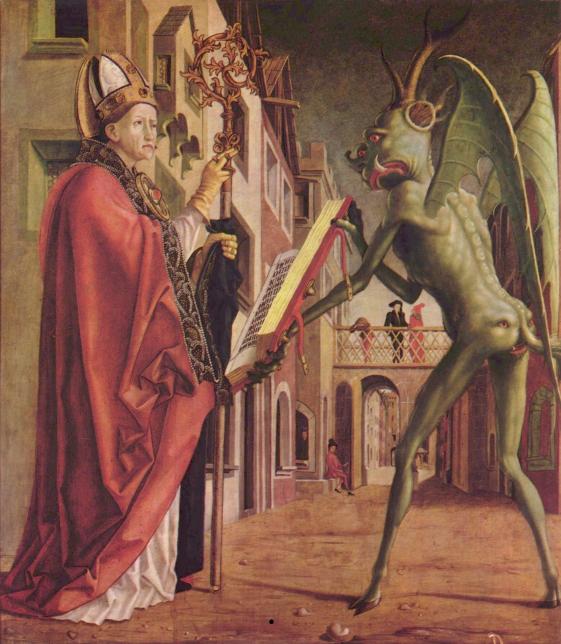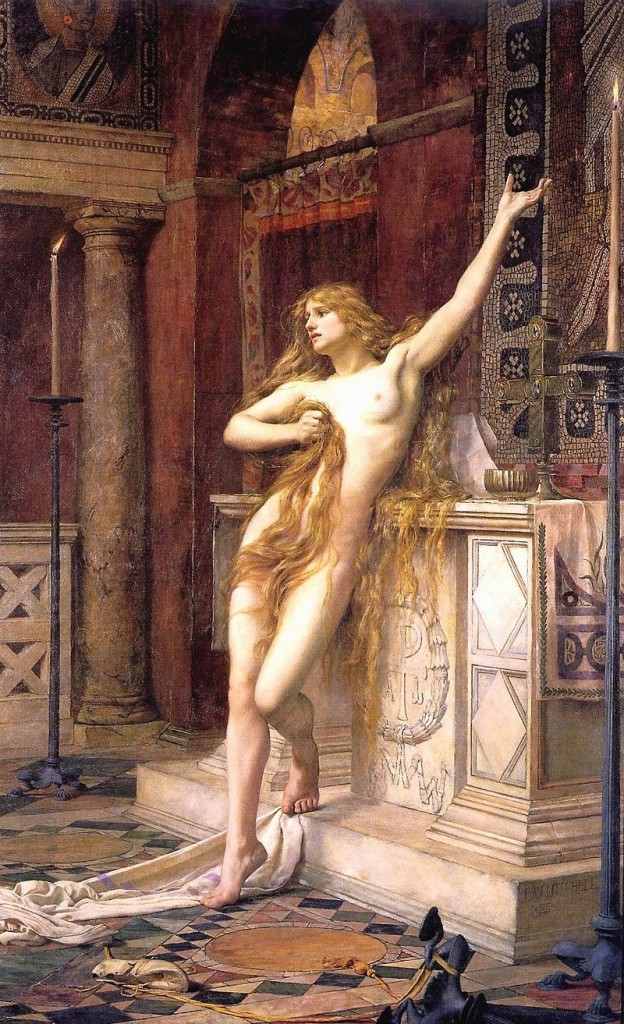
As I read more and more of the research my guest blogger, Ike Fehr, shares with regards to the connection between Ancient Astronauts and world religions, I see evidence that perhaps the beliefs handed down to me in my Sunday School classes may have missed out teaching me a couple of key facts. And perhaps, my teachers were as unaware of the missing facts as were their predecessors.
This is not surprising because most of my Lutheran upbringing and knowledge of God was based on the King James version (KJV) of the bible. In fact, many Protestant churches consider this translation of the Bible to be the authority.
King James and Witchcraft
The King James version of the Bible was called the “translation to end all translations.”
Additionally, the endeavor required the efforts of fifty scholars. However, these translators were influenced by the Roman Catholic Rheims New Testament not the Geneva Bible.
The Geneva Bible is textually 95% the same as the KJV Bible. Equally important — and herein lies the irony — many Protestant Christian churches embrace the KJV as the only legitimate translation. Contrarily, it is Catholic based not Protestant. Whereas, the Geneva Bible was protestant based.

More to the point, did you know that during his rise to power, King James VI (aka King James I) put many women to death for witchcraft. In particular, he was personally involved in the 1590 North Berwick witch trials.
Seems as if King James would be an unlikely candidate to oversee the translation of such an important sacred doctrine such as the Bible. Especially since scripture teaches compassion, the Golden Rule, and not to be judgmental.
And yet many of our beliefs and practices are based on this one particular translation.
So when I read about new concepts evolving from the Bible—ones I was never taught—I keep an open mind. Heaven only knows if King James did.
Moses Was a Polytheist by Ike Fehr

(IkeNote: In these posts Bible quotations are printed in red. Quotations from other writers are in blue, and my own quotes and paraphrases are in pink.)
Many of the religions of the world have developed along very similar lines, all started with a plurality of Gods. Many religions, over the course of the centuries, have changed to monotheism. The Jewish religion is no exception to this trend.
Concerning this topic, Theophile James Meek, a frequent contributor to the Encyclopedia Britannica, writes:
Among critical scholars today there is none who claims monotheism for anyone earlier than Moses. (Hebrew Origins. Theophile James Meek, Harper Torchbooks. 1960).
Later he writes: (ProbeNote: El is a generic name for god and can refer to any god.)
El may have been a great High God to the people of Ugarit (ancient Ras Shamra), but along with him were hosts of other deities, many of them little less important than He. (Hebrew Origins. Theophile James Meek, Harper Torchbooks. 1960).
The oral traditions handed down from Adam to Moses spoke of a plurality of gods. However, when Moses recorded the history of Israel, he emphasized the Lord of the Jews, Jehovah.
Furthermore, Moses chronicled him as the God that called Abram from Ur, the God that lay claim on Jacob’s life, and the God that later delivered the Jews from Egypt. Considering the mighty deeds that Jehovah had done for them, it is not surprising that they affirmed that, for their nation, there was only one God.
The Royal We
In speaking about the plural pronouns in reference to God, in the opening chapters of Genesis, it is insisted by many that God is, in fact, singular. However — in speaking of Himself — God is using what is known as “the royal we.” If that were the case, it would be proper for Him to say “us” although He meant only himself.
Admittedly, this is one way of explaining the problem, but it sounds like nothing more than an easy way out of an interpretation dead end. Concerning the problem of the plural pronoun, the well-known author, Isaac Asimov, said the following.
It is possible to argue that this (the plural pronoun) is not true evidence of early polytheism. God might be viewed as using the royal “we”; … Nevertheless, as far as we know…early beliefs were always polytheistic and monotheism was a late development in the history of ideas. (Guide To The Bible. Isaac Asimov, Avenol Books. New York).
Other Gods
It is not without importance that even the first commandment emphasizes the fact that there are other gods. Notice that the commandment explicitly says, You shall have no other gods before Me (Ex. 20:3).
Dr. James Strong, a Methodist Theologian, in his Dictionary of Hebrew Words of the Old Testament , says we must use the same plural word for God that we used in Genesis 1:1.
There, obviously, the word did not refer to idols and so it cannot refer to idols here. It refers to plural, real, living gods. If these other gods were pieces of metal or stone only, surely, Jehovah would not be so hung up about it. In any case, it was not idols that created the heavens and the earth.
Karen Armstrong, author of the New York Best Seller A History of God, puts it this way:
The idea of the covenant tells us that the Israelites were not yet monotheists, since it (the covenant) only made sense in a polytheistic setting. The Israelites did not believe that Yahweh, the God of Sinai, was the only God but promised, in their covenant, that they would ignore all the other deities and worship him alone. (Karen Armstrong, A History of God Bellantine Books, New York.)
It would seem, at a casual glance, that a good argument against the plurality of the gods would be the verse, which reads, Hear, O Israel: The Lord our God is one Lord (Deut. 6:4).
Henry Clarence Thiessen, once Chairman of the Bible and Theology Department of Wheaton College, said: that there is but one God is the great burden of the Old Testament. (Lectures in Systematic Theology. H.C. Thiessen, Eerdmans Publishing Co., Grand Rapids, Mich.)
To understand that verse this way is to overlook one basic fact. The fact that the Old Testament is a book written by the Jews and for the Jews. Rather than arguing for the singularity of God this verse indicates that each nation, including Israel, has its own god or gods.
To make his statement read right, Thiessen should have written, that there is but one God, for the Jews, is the great burden of the Old Testament.
Moses, speaking to Israel only, said, Israel, we have only one God, we are not like other nations, which have many gods. The Psalmist reiterated that statement with, Happy is the nation whose God is the Lord, the people whom he has chosen as his heritage (Psalm 33:12.).
The Psalmist also said, For the Lord is a great God, and a great king above all gods (Psalms 95:3). In reference to the word, gods, as used in the Bible, Dr. Strong tells us that its meaning is, mighty ones. That definition does not fit the meaning of dead idols.
Mighty Judges
Asaph, author or transcriber of Psalms, takes up this theme, he wrote, God stands in the congregation of the mighty; He judges among the gods (Psalm 82:1). Bible students, with a traditional mindset, of course, cannot allow the thought that God judges among other gods (since they believe that there is only one God). Therefore, in the footnotes they write words such as, gods, as it is used here, is elohim, which means judges.
This would mean that Jehovah arbitrates among judges. That then becomes an interesting subject because, elohim, is the word that Christ used when, on the cross, He cried out, “Eloi (Elohim) Eloi (Elohim)…why have you forsaken me”?
Was Christ actually asking a judge, other than His father, why have you forsaken me? Either this is true or the word, judges, in Psalm 95:3 refers to gods other than Jehovah.
Many modern writers claim that ancient religious books, including the Bible, speak of a myriad of gods in the universe, and because the Bible also says so, Christians should accept that idea. At the same time, insisting that, for them, Jehovah is their only God.
In opposition to the idea that there are a myriad of gods in the universe, or in the Bible, there are verses such as. The earth is the Lord’s and the fullness thereof (Ps. 24:1). Or, For all the earth is mine (Ex. 19:5). To find these thoughts in the Bible is not surprising because the Israelites were so overwhelmed with what Jehovah had done for them they credited every awesome and wonderful thing to Him. Even those things for which the Akashic field is responsible.
More About the Experts
Theophile James Meek is cited for having suggested that the Song of Solomon from the bible has similarities to the Babylonian fertility myth. He has been published widely on archaeology and was a frequent contributor to the Encyclopedia Britannica.
Isaac Asimov is best known for his science fiction and popular science books. He is considered by some to be one of the foremost science fiction writers during his lifetime. He wrote I, Robot which was made into a popular movie.
James Strong was a Methodist biblical scholar, educator, and theologian. He is the creator of Strong’s Concordance which is a comprehensive cross reference of every word in the King James Version of the bible back to the word in the original text.
Karen Armstrong is a British author and commentator known for her books on comparative religion. She began as a Roman Catholic sister, but went from a conservative to a liberal and mystical religious faith. In 1993, she rose to prominence with the publication of her book, A History of God The 4,000 Year Quest of Judaism, Christianity and Islam. Her focus is on the commonalities among the major religions such as the Golden Rule and compassion.
H.C. Thiessen is a noted theologian who spent many years as Chairman of the Bible and Theology Department of Wheaton College. Debilitated by asthma, and on the advice of his doctor to seek a warmer climate, Thiessen accepted an invitation to serve as president and dean of Los Angeles Baptist Seminary in 1946. He died a year later.
About Ike

My guest blogger graduated from Columbia College in Vancouver, B.C. He is also graduated from Columbia Bible College after three years of intensive Bible and pastoral training. He has devoted over forty years to biblical research in hopes of discovering answers.
Ike starts his blogspot, which he calls Spaceship Theology, with an intriguing statement:
Considering all the advancements in the various fields of study in the last few hundred years, it is interesting that theologians are not willing to look at the Bible again and read there what it really says.
What are your thoughts? Could there have been other gods at the time of Moses? I love hearing from you.
The Probe’s Mission Statement
The Probe is a blog devoted to the exploration of the unexplainable, to finding the truth in occurrences that resemble science fiction, and to researching and reporting on topics that could be flung upon the wall of weird.
Sign up on the homepage to get my weekly, slightly irregular blog posts delivered directly to your email. No spam. Promise.
- Coghlan’s Traveling Coffin Urban Legend - April 4, 2024
- Richmond Vampire Urban Legend - March 7, 2024
- Lick Lick Urban Legend - February 8, 2024
